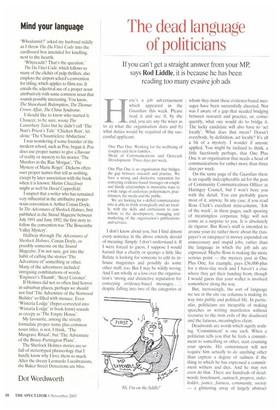Mind your language
'Whodunnit?' asked my husband mildly as I threw The Da Vinci Code into the cardboard box intended for kindling, next to the hearth.
'Whyreadit? That's the question.'
The Da Vinci Code, which follows so many of the clichés of pulp thrillers, also employs the airport school's convention for titling, which applies to films too. It entails the adjectival use of a proper noun attributively with some common noun that sounds possibly interesting. You know, The Shawshank Redemption, The Thomas Crown Affair, The China Syndrome.
I should like to know who started it. Chaucer, to be sure, wrote The Canterbury Tales but he didn't call 'The Nun's Priest's Tale' Chicken Run', let alone `The Chaunticlere Abduction'.
I was wondering if some founder of the modern school, such as Poe, began it. Poe does use proper names to give a flavour of reality or mystery to his stories: The Murders in the Rue Morgue', 'The Mystery of Marie Roget'. Dickens often uses proper names that tell us nothing, except by later association with the book when it is known: Martin Chuzzlewit might as well be David Copperfield, I suspect that a writer who has remained very influential in the attributive propernoun convention is Arthur Conan Doyle. In The Adventures of Sherlock Holmes, first published in the Strand Magazine between July 1891 and June 1892, the first story to follow the convention was 'The Boscombe Valley Mystery'.
Halfway through The Adventures of Sherlock Holmes, Conan Doyle, or possibly someone on the Strand Magazine, I'm not sure, got into the habit of calling the stories 'The Adventure of something or other. Many of the adventures included intriguing combinations of words: 'Engineer's Thumb', 'Beryl Coronet'.
If Holmes did not so often find horror in suburban places, perhaps we should not find 'The Adventure of the Norwood Builder' so filled with menace. Even 'Wisteria Lodge' (hyper-corrected into 'Wistaria Lodge' in book form) sounds as creepy as 'The Empty House'.
My favourite, among the strictly formulaic proper name plus common noun titles, is not, I think, 'The Musgrave Ritual', but 'The Adventure of the Bruce-Partington Plans'.
The Sherlock Holmes stories are so full of stereotyped phraseology that hardly know why I love them so much. After the dreary Leonardo Lucubrations, the Baker Street Detections arc bliss.
Dot Wordsworth


























































































































 Previous page
Previous page